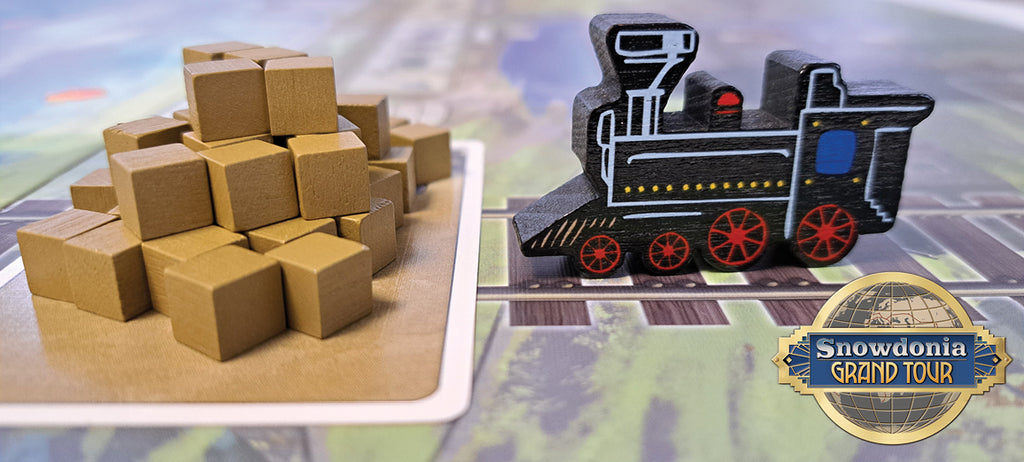In all pursuits in life, there are obstacles that will stand in your way. In Snowdonia, that obstacle is rubble. You want to build a railway and its stations… but you cannot do so without first getting your hands dirty excavating. Grab a shovel and let’s dig into the B action.
What is excavation and what do I get for doing it?
The excavation action will move rubble from the line into your personal supply. How much you excavate is based on the work rate. This could be as low as 1, or with clever use of contract cards and other effects, reach into double digits.
The first benefit is the gained rubble, used to score contract cards or convert into stone. The second benefit is scoring points by excavating the final rubble from station spaces. Excavating is also necessary to progress the game; track and stations cannot be built until the rubble in the way has been cleared first.
What is the value of rubble?
I would argue the primary purpose of rubble in most scenarios is to score contract cards. Contracts demanding leftover rubble can be worth a lot of points and, compared to track or building, achieved more efficiently (weather permitting). Rubble generally has high availability vs station and track opportunities also.
For example, the highest scoring rubble contract in the default deck scores a hefty 21 points for 16 rubble. If the work rate is at 4 and you have a contract that doubles that for a round, you can get 16 rubble in just two B worker placements. You’ll likely score some station bonuses as part of the process too.
Rubble taken to the works can be converted into stone at a ratio of 2 to 1. Taking stone for free from the stock yard is better value, but converting can be useful when there is no free stone available. This conversion can also be a handy way to grab a stone you might need in a pinch if only crafting 1 or 2 steel bars.
How good are these station excavation bonuses?
Very good. They’re usually the only way to score points and gain resources at the same time. It’s incredibly efficient to claim these in most cases. This is where positional placement on the B action card becomes very important though. Only the player removing the final rubble gets the bonus, so you may want to deliberately excavate in a later position to make that happen.
Are there any other benefits to excavating?
Yes, but they affect everyone. Removing rubble will open up valuable opportunities to score track and buildings. In some games, these will be snapped up very quickly. A good way to ensure you’re the one benefitting is to take your lay track(D) or build(E) action with your first worker then excavate with your second. This way you get access to the new scoring opportunities before your opponents do.
Excavating will also push the game closer to ending: the line needs to be fully excavated before the game-ending track can be laid. This isn’t strictly beneficial, but sometimes closing the game out quickly is in your interest: for example if you believe you are currently winning, or feel other players' late-game scoring opportunities are better than yours.
Wow excavation is clearly the best action in the game, I’m going to do it all the time!
Not so fast! Compared to other actions, the value of excavating varies wildly. Played incorrectly, excavation will open up scoring opportunities for opponents while giving you very little in return:
If the work rate is low and you have no bonuses, it is, frankly, one of the worst actions you can take. Take the example above where we obtained 16 rubble in 2 B placements, to achieve that with a work rate of 1 and no bonuses would take 16 B placements. That’s less than half the efficiency of simply moving your surveyor to the top of the mountain… which is already considered a weaker option in most contexts.
Even if the work rate is high, things can still go awry. If you place workers in poor positions, other players will score track, buildings and station excavation bonuses you’ve just spent precious actions opening up. Yet worse, if you don’t manage to obtain good rubble contracts, then the rubble you’ve gained in this process will largely be useless too.
Wow, this all sounds very context dependent, is there anything else I should consider?
Contextual dependence is the fundamental essence of Snowdonia! The scenario you’re playing often has a big impact too. For example, in the Uganda Railway scenario in our upcoming Grand Tour expansion, there are many changes to excavation to take into account:
- Excavating places your workers onto the track, where they risk getting attacked by lions and removed from play for a round.
- The excavation rate can go up to 5, but players will need to get water to spend to be able to make use of that.
- The station excavation bonuses provide water instead of points.
- The first player marker is obtained by placing a worker on the final B action space instead of A.
- Once the line is fully excavated, an infinite source of rubble becomes available.
It would be impractical to go into the microcosms of every scenario’s excavation mechanics here. But the above hopefully illustrates that you can’t take your excavation strategies from Snowdon and expect them to work equally well elsewhere.
That’s all for today, we’ve dug more than deep enough. Before you go though, are you a fan of excavation based strategies? Do you find yourself able to win without excavation? What’s the most rubble you’ve ever excavated in a single turn?
If you’d like to receive all the latest Snowdonia: Grand Tour news before anyone else, sign up to the mailing list here.
If you’re interested in playtesting Grand Tour and are able to make “print and plays”, you can sign up to our playtest mailing list here.
Jaya Baldwin


Leave a comment